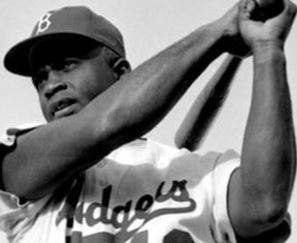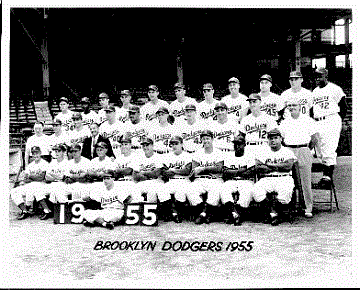 |
| (http://www.wsvn.com/images/news_articles/389x205/070411_Jackie_Robinson.jpg) |
"Courage is not the absence of fear, but rather the judgement that something else is more important than fear” (Ambrose Redmoon). This quote by the distinguished writer Ambrose Redmoon rightly describes Jackie Robinson, the first African American man to play in the Major Leagues in baseball. During his baseball career, Robinson had to endure many hardships caused by threats and hatred from racist baseball fans and fellow teammates. Many people fought against Robinson as he broke through the color barrier that stood in the sport of baseball, but through his courage and good decisions he gained popular support and became an inspiration to many people around the world.
 |
| Jackie Robinson (http://static.newworldencyclopedia.org/4/42/Jrobinson.jpg) |
Jackie Robinson showcased his courageous disposition through his actions. Similar to the fearless and determined African American woman Rosa Parks, Robinson also stood up for the rights that he knew that he deserved. One day in the deep South an African American boards a segregated bus and takes a seat in the “whites only” section. The passenger refuses to move when asked and is arrested minutes later. This boycott was not the work of world renowned Rosa Parks, but of Lieutenant Jack Robinson (Europe Intelligence Wire). Robinson made a tough decision when he chose to sit in the wrong section of the bus even though he understood that he would be arrested. It took courage for him to decide that he needed to stand up for his rights and the rights of the others around him. Jackie Robinson also proved his courage by becoming the first ever colored man to play in the Major Leagues. “Jackie Robinson may have had more influence on the integration of sports than any other athlete in history. When he began playing with the Brooklyn Dodgers in 1947, he broke the color line in professional baseball and paved the way for the entry of black players into all professional sports” (DISCovering Multicultural America). It took a lot of courage for Robinson to try something that no other like him had done before. Playing as the first colored man on an all white team was a very courageous feat to accomplish. History has correctly labeled Robinson a hero because of his courageous actions and decisions that benefited not only him, but also the people around him.
Robinson showed through his good decisions that he would not let the disapproval of fans and teammates bring him down. Many people believed that Robinson wasn’t doing the right thing by breaking down the segregation that stood in the Major Baseball leagues, and they made it clear to him. “Pitchers often threw the ball directly at Robinson, base runners tried to spike him, and he was subjected to a steady stream of racial insults. Through it all, though, Robinson held his tongue in deference to [his manager’s] wishes” (DISCovering Multicultural America). When Robinson was harassed and threatened he could have easily stood up for himself, but he chose not to let the insults get to him. Deciding to turn the other cheek was not easy for him, but he realized that this would be the best decision for everyone. Another way that Jackie Robinson made good decisions was the way he diverted his frustrations from the racist people who opposed him in sports. Robinson channeled his frustration and anger over racism into sports and let his playing speak for his character (Encyclopedia of U.S. History). Robinson chose a positive outlet for his frustration and anger with those around him. He could have decided to let out his anger at the people who where causing him his anger, but he chose the better solution and let everyone judge him by his playing skills, not the color of his skin or his fight. Robinson became a heroic man because of the smart decisions that he made.
 |
| Dodgers Team Photo 1955 (http://ep.yimg.com/ca/I/mipakaco-photos_2098_12602125) |
“This ain't fun. But you watch me, I'll get it done” (Jackie Robinson). Robinson became an inspiration to many people during his time. He helped African Americans begin to play in white sports leagues, which led to less segregation between the people of America. Robinson also helped to encourage those who didn’t expect they could achieve their dreams just because nobody believed in them. Many of Robinson's peers and baseball fans constantly reminded him of his unwanted presence. Even though he had to withstand the threats and be treated with hatred he kept on persevering until he reached his goal of becoming one of the best baseball players of his time. Robinson teaches that no matter how many people are against you, if you believe in yourself and keep fighting for what is right, then you will always be victorious.
Works Consulted
"Jackie Robinson day." Europe Intelligence Wire 15 Apr. 2010. General Reference Center Gold. Web. 6 May 2010.
Nightingale, Dave. "Robinson, Jackie." World Book Student. World Book, 2010. Web. 7 May 2010.
Parker, Gregory L. "Robinson, Jack Roosevelt (1919-1972)." Civil Rights in the United States. Ed. Waldo E. Martin, Jr and Patricia Sullivan. New York: Macmillan Reference USA, 2000. Opposing Viewpoints Resource Center. Gale. DEL NORTE HIGH SCHOOL. 7 May. 2010.
"Robinson, Jackie (1919-1972)." DISCovering Multicultural America. Online ed. Detroit: Gale, 2003. Student Resource Center - Gold. Gale. DEL NORTE HIGH SCHOOL. 7 May. 2010.
"Robinson, Jackie." U*X*L Encyclopedia of U.S. History. Sonia Benson, Daniel E. Brannen, Jr., and Rebecca Valentine. Ed. Lawrence W. Baker and Sarah Hermsen. Vol. 7. Detroit: UXL, 2009. 1324-1327. Gale Virtual Reference Library. Web. 7 May 2010.
The Jackie Robinson Foundation. Web. 07 May 2010. http://www.jackierobinson.org/about/jackie.php.
The Official Site of Jackie Robinson. Web. 07 May 2010. http://jackierobinson.com/.
Page created on 5/25/2010 12:00:00 AM
Last edited 5/25/2010 12:00:00 AM
